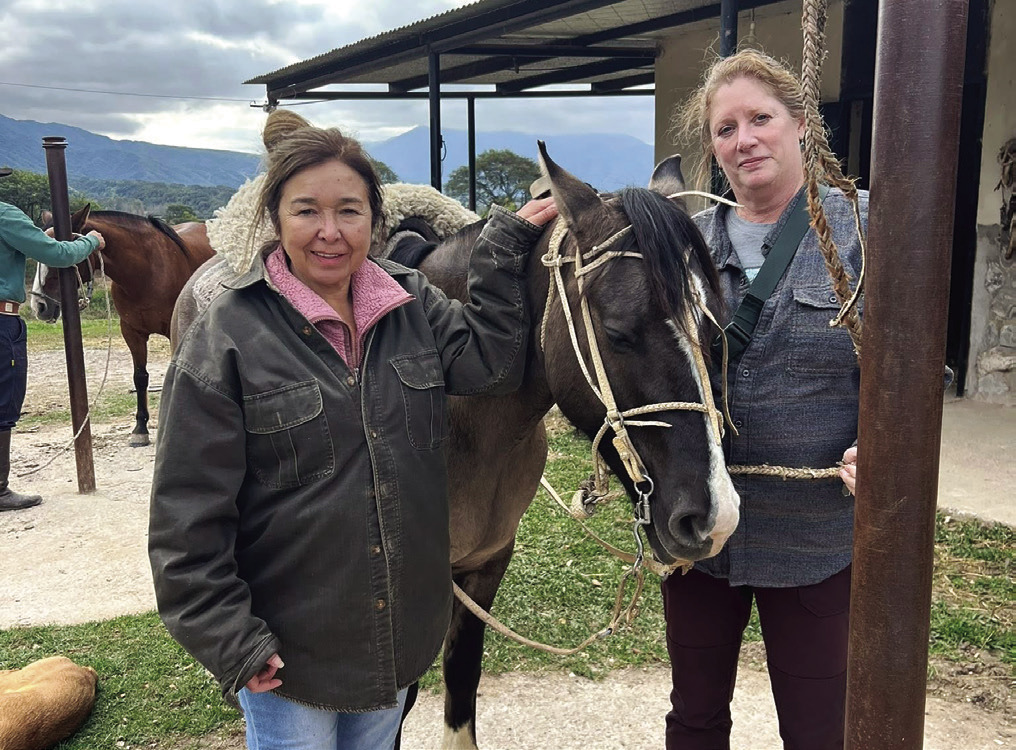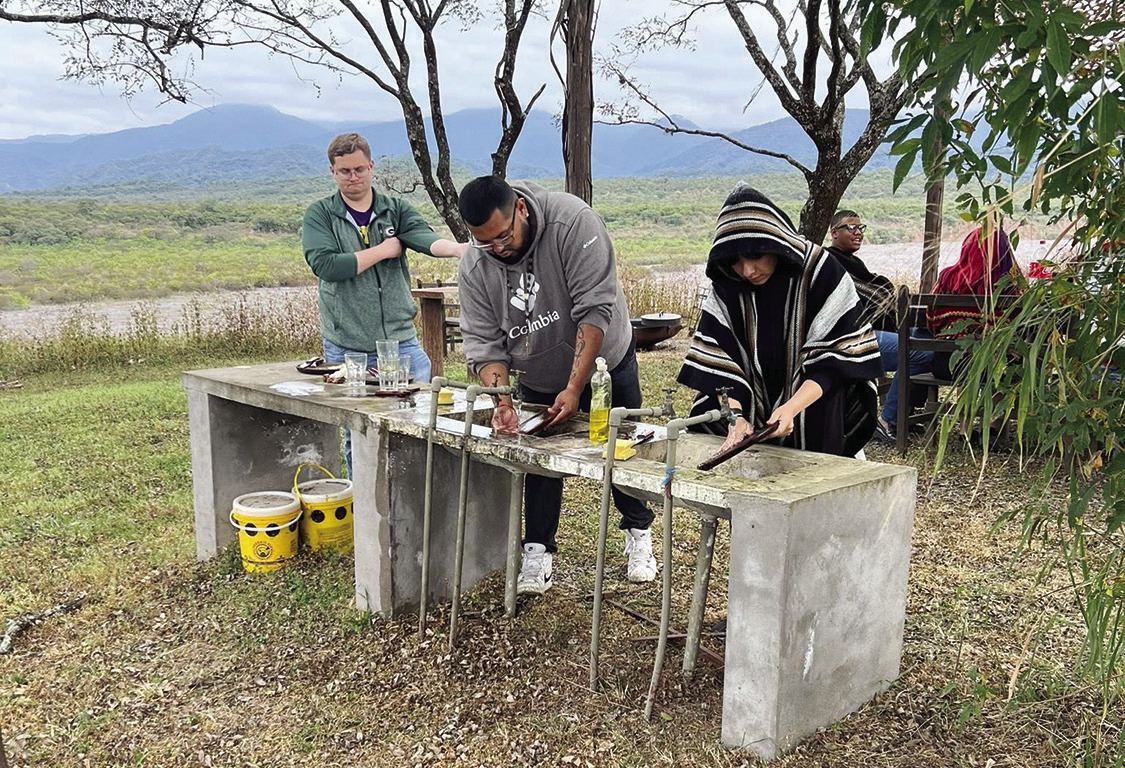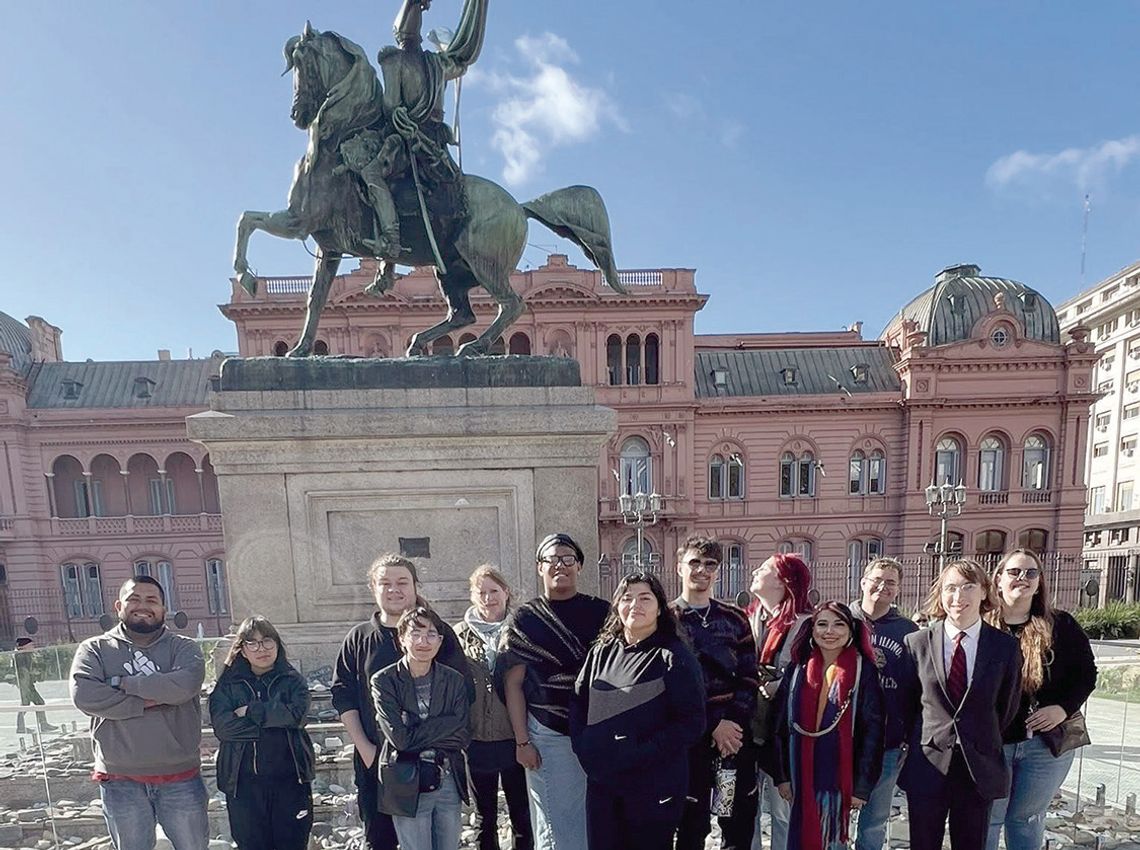According to the NAFSA: Association of International Educators, the number of U.S. students studying abroad for credit during the 2022-23 academic year increased by 49 percent to 280,716 students. As the Spring 2025 semester came to a close at Western Illinois University, two WIU professors took a group of 12 students to Argentina for a three-week intensive visit to the South American country.
NAFSA has long advocated for policies such as the Senator Paul Simon Study Abroad Program Act to expand the total number of U.S. students studying abroad. Through such programs like Political Science Professor Julia Albarracin- Green's trip to her home country, Western is helping achieve the goals in the Simon Act. While the trip took place in May 2025, with Anthropology Professor – and Study Abroad guru – Heather McIlvaine-Newsad going along to assist – it has been 10 years in the making.
The trip, when it came to fruition, was funded by a $250,000 U.S. Department of Education Title 6 grant, which included a component of building relationships with three countries. A visit was initially made in 2014 to begin the planning, but then due to various issues, including COVID, the planned trip was put on hold. Two years ago, Albaraccin-Green and McIlvaine-Newsad ventured back to Argentina to lay the groundwork for the collaboration between La Universidad Católica de Córdoba and WIU. The duo also had China and Tanzania on the list as part of the grant; however, those trips didn't come to fruition, so working with the Department of Education, they refined the grant so that the extra funding that was available would go directly to the WIU students. Reallocating funds made it possible for students to experience three weeks of Albarracin-Green's poli sci course, 'Latin American Politics' in Argentina.
'This generous grant provided support for our students from a variety of majors and disciplines to take part in this experience. It paid for part of their travel, their lodging and meals,' Albarracin-Green explained. 'Only 10 percent of students in the United States go abroad, with most of those students coming from private liberal arts colleges. Our students don't have as many opportunities, yet these experiences are so important for our diverse world.'
McIlvaine-Newsad added that trips such as this provide a transformational experience for their students, particularly those first-generation college students.
'We had several students taking part who are the first in their family to attend college or the first in their family to hold a passport and travel outside of the country,' she added. 'It changes everything about how they view the world.'
Both women shared they plan on working on getting more funding so this trip, among others, can be more permanent fixtures in their courses.
'Seeing a country and its politics first hand is very different than just learning about it in books,' Albarracin- Green pointed out. 'You never forget it, and it really can change your worldview from that point forward. In Argentina, they were seeing what they learned with their own eyes, and this is also helpful for me as a professor, seeing how my students are experiencing what they're learning. I got to see my own country through their eyes.'
For Albarracin-Green, this was her first time leading a study abroad trip, which is why she brought McIlvaine-Newsad along as it was her 12th study abroad experience. The journey was 36 hours 'door-to-door' taking the group of 14 to their destination via planes, trains and automobiles. Two participants, Aiden Quinn Necak, a Macomb High School alumnus and recent Western graduate, and Ivan Cortez, a recent graduate who is now teaching at Beardstown High School, said that getting a new perspective on what life is like elsewhere is important to growth and learning.
'I went on this trip because I wanted to step outside of my usual environment and experience life from a different point of view. I've always been curious about how people live in other parts of the world, and I thought this was a great way to really see and feel a new culture instead of just reading about it,' Cortez shared. 'I also wanted to challenge myself—to grow in ways that only come from being in unfamiliar places and situations. It felt like the perfect opportunity to learn both academically and personally.
Cortez, despite traveling to Mexico several times over his lifetime, still learned lessons in being open to new experiences, and most of all, being flexible.
'Things don't always go according to plan when you're somewhere new, and learning to go with the flow makes the experience much more rewarding. I also realized that despite cultural differences, people share many similar values and hopes,' he added. 'The trip helped me build confidence and independence, and it made me appreciate the simple things I might have overlooked before. It was a reminder that growth happens when you put yourself in new situations.
For Necak, who has previously studied abroad, the trip to Argentina allowed him to capture a first-hand glimpse at the country he learned about in the classroom.
'I was eager to meet more people with different stories and backgrounds, try new cuisine and enjoy the beautiful scenery that I heard Argentina had to offer,' Necak said. 'Getting a new perspective on what life is elsewhere is important; it helps you to be thankful for what you have. It also shows the differences and the similarities between our culture and others. I would also say traveling is a great example of things not going to plan, that is just like life, and you know what, everything will be okay. Traveling has allowed me to grow as an individual and be more content with what I have.
It has also allowed me to connect with people from all over the world, and I can now call them friends.'
McIlvaine-Newsad added that for many individuals, they grow up where everyone around them is similar, and this can be especially true in rural communities like Macomb. By traveling abroad, they can see people who are different from them culturally, yet experience the same 'human' issues such as where to eat and sleep, how do they get from point A to point B, how to keep their families safe and healthy and the list goes on.
'Seeing how others tackle the very same issues we deal with is incredibly important,' she noted. 'One of the students noted how different the food was that we experienced – here we have highly processed food, but there it was always so fresh and not packaged. We cooked from scratch when we were in the apartments, and those who hosted us also cooked homemade meals for us.
Everything just tasted better. Our students also noted that we walked everywhere and didn't rely on public or private transportation.'
As for the political landscape, that's a big part of Albarracin-Green's course, and one that students noticed as the country has experienced the same immigration-related policies as the United States has, which put 'white people first' (in this case, Northern Europeans). Those European settlers restricted the immigration of Black and Brown people, and killed many Native Americans. The students also saw communities of Germans as Argentina was a haven for the Nazis who fled Germany during and after World War II, living alongside large communities of Jewish people, including Orthodox Jews.
'Our students also got to see indigenous cultures that are still alive and thriving,' Albarracin-Green discussed. During the 21-day experience, the students took part in daily life in both cities, including the capital of Buenos Aires, and rural farming communities, including visiting a horse ranch, on the border of Chile and Bolivia. The ranch is, owned and operated by one of Albarracin-Green's friends. A bonus part of the trip: learning to Tango.
'Everything our students saw and did was 'real.' We didn't do the 'tourist' part, but the real Argentina,' Albarracin-Green stressed.
'In Buenos Aires, we rented apartments and we lived where people lived. This is part of an immersive experience that truly links what they've read and learned in the classroom with what they're seeing and living.'











